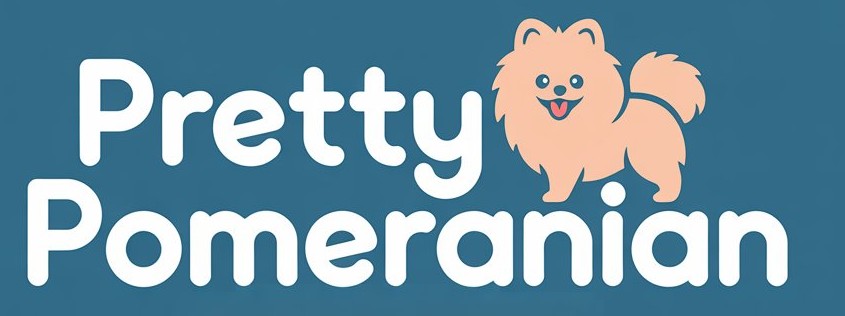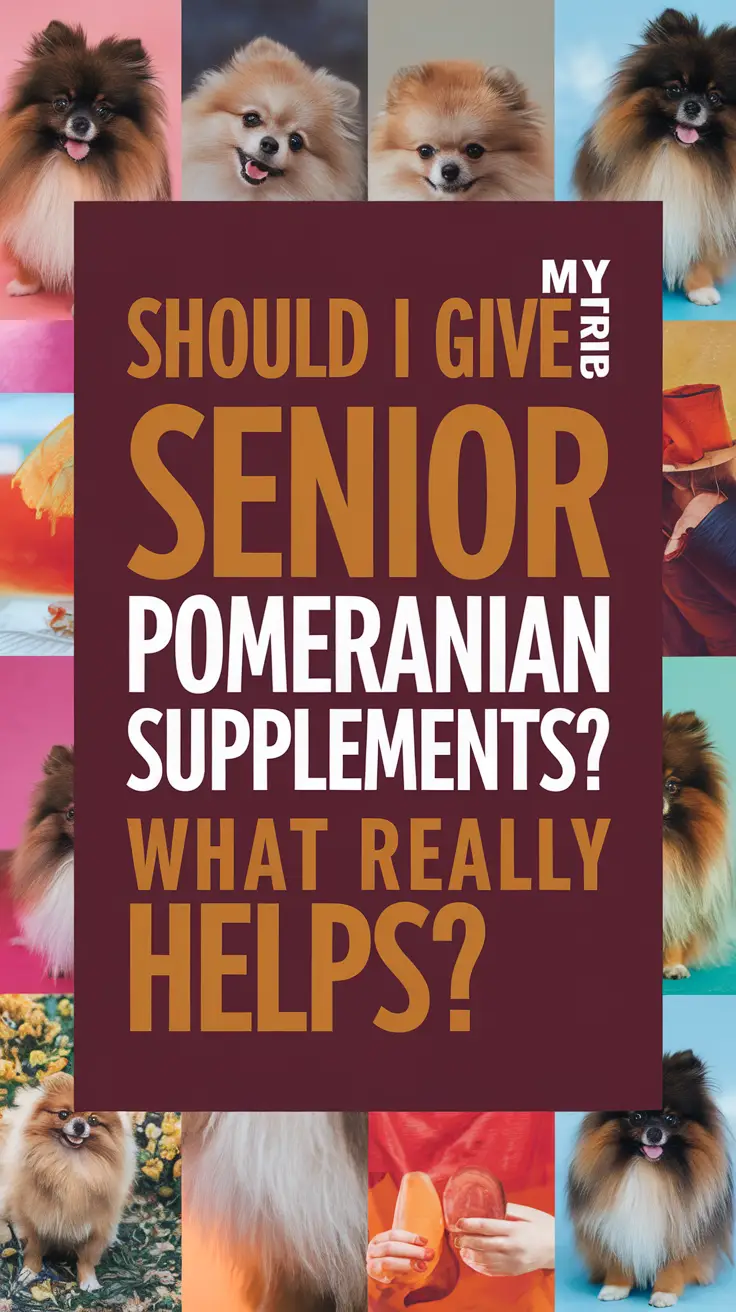Want your Pom smelling fresh? It's pretty simple – just stick to a regular grooming plan!
Get in there with a brush about 3 times a week to get rid of all the gunk and oils that make your pup stinky.
Give them a good bath every 3-4 weeks with a shampoo made for dogs (and don't skip on the rinsing!).
Their teeth need love too – brush them a few times weekly and throw in some crunchy treats to help keep their mouth clean.
Watch what they eat – too many grains can mess with their tummy and make them smell funky.
Between baths? Just grab some pet wipes for quick clean-ups.
There's tons of ways to keep your fluffy buddy smelling amazing!
The Science Behind Pomeranian Smells
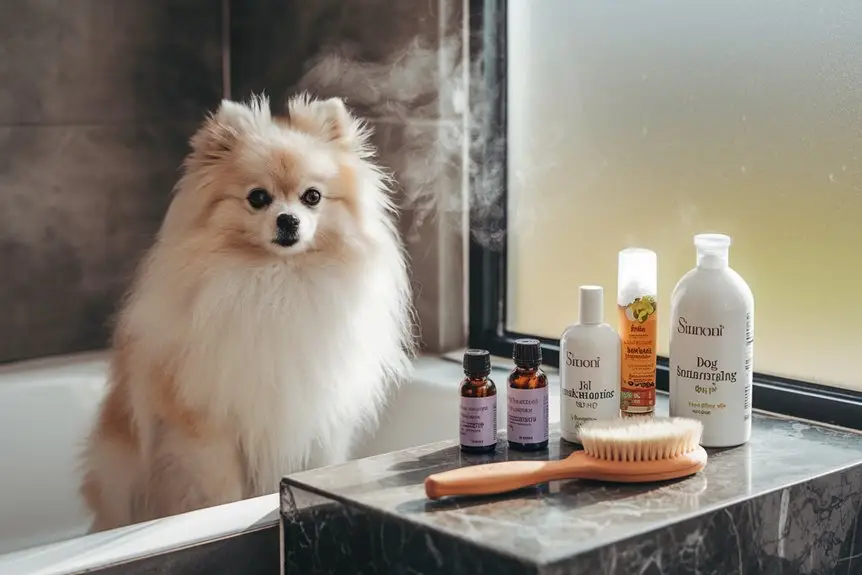
Did you know your Pom's unique smell comes from a bunch of different things happening in their tiny bodies? Their fluffy double coat isn't just for looking adorable – it actually catches oils, dead skin, and all sorts of stuff from the environment, which gives them their special scent. Think of it like a furry sponge that soaks up everything!
Those natural oils coming from your Pom's skin glands are super important – they're like a built-in bodyguard for their skin and fur, but they can build up if you're not careful. It's pretty interesting how your pup's DNA plays a big role in how much oil they make and what their personal scent is like.
And get this – that thick undercoat they're famous for? It can create a warm, moist space next to their skin, kind of like a mini sauna. While that sounds cozy, it means bacteria might party there if you don't keep up with grooming. So when your Pom smells a certain way, it's not just about whether they need a bath – it's about all these natural things happening under that fluff ball exterior!
Regular brushing every 3-4 weeks with proper bathing is essential to prevent dirt and dander from becoming trapped in their dense double coat.
Essential Grooming and Bathing Tips
Hey, keeping your Pom smelling fresh is pretty simple with a good grooming routine! Just grab your brush and go through that fluffy double coat about three times every week – this helps kick out any trapped smells and dirt. Give your pup a bath every 3-4 weeks with a nice dog shampoo, and make sure you rinse super well so their skin doesn't get irritated.
Here's a neat trick: have two sets of bed stuff for your Pom. While you're washing one, use the other – that way, they always have a clean place to snooze. If your pup uses a crate, don't forget to wash that liner often, or it'll start getting stinky!
Between bath times, just grab some pet-safe wipes to clean your Pom's face, paws, and private areas. Keep an extra close eye on spots that stay wet – those areas can get pretty smelly if you ignore them! Try using Baby Fresh Shampoo during baths to deep-clean and nourish your Pom's coat while addressing any lingering odors.
Maintaining Healthy Teeth and Gums
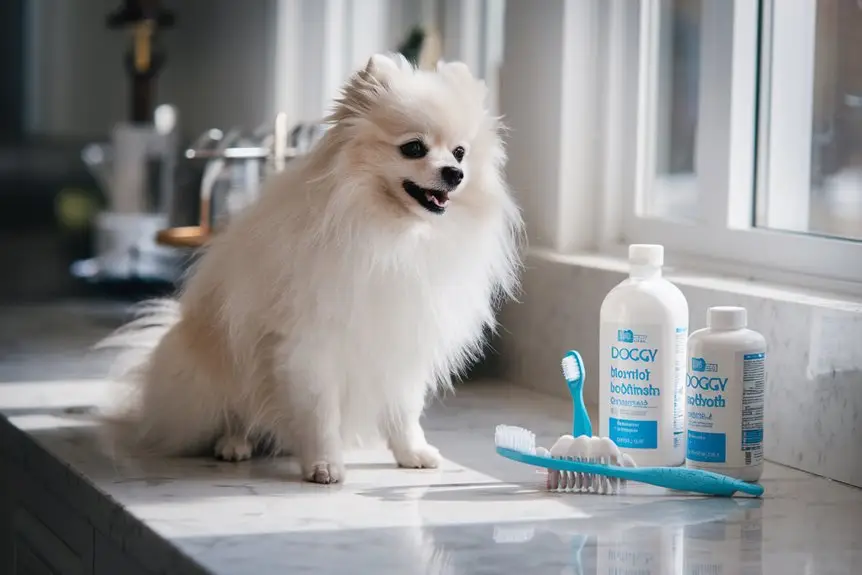
Hey, taking care of your Pom's teeth is super important – nobody wants to deal with stinky puppy breath ruining all that cute grooming! Getting into a good dental routine will stop nasty stuff like plaque and infections from making your pup's mouth smell bad.
Try brushing your Pom's teeth a few times each week with special doggy toothpaste. If your dog isn't used to it, take it easy and don't rush – especially with older pups. You can also give them crunchy snacks like carrots or dental treats that naturally help clean their teeth while they munch.
When you see lots of buildup on their teeth, don't skip out on getting them professionally cleaned. Getting a good Dental Cleaning Kit helps keep things fresh between vet visits. If your pup's breath stays stinky even with regular cleaning, get them checked out – it might mean there's something going on that needs fixing right away. Untreated dental problems can lead to gum inflammation and make it difficult for your Pomeranian to eat comfortably.
Managing Anal Gland Problems
Having trouble with your Pom's smelly anal glands? Those tiny sacs next to their butt can get clogged up when they don't empty on their own during potty time.
Watch out for your pup putting on too much weight since it can mess with how well these glands work. If you catch your dog dragging their bottom on the floor or licking back there way too much, it's definitely time to see the vet. Getting enough fiber in their food helps keep their poop firm, which naturally squeezes those glands when they do their business. Getting your pup moving with regular walks helps too. If it keeps being a problem, your vet might need to squeeze those glands every now and then or switch up what your dog eats to stop the stink and keep them comfy. Professional expression typically costs around thirty dollars for each visit to maintain healthy anal glands.
Proper Ear Cleaning Practices
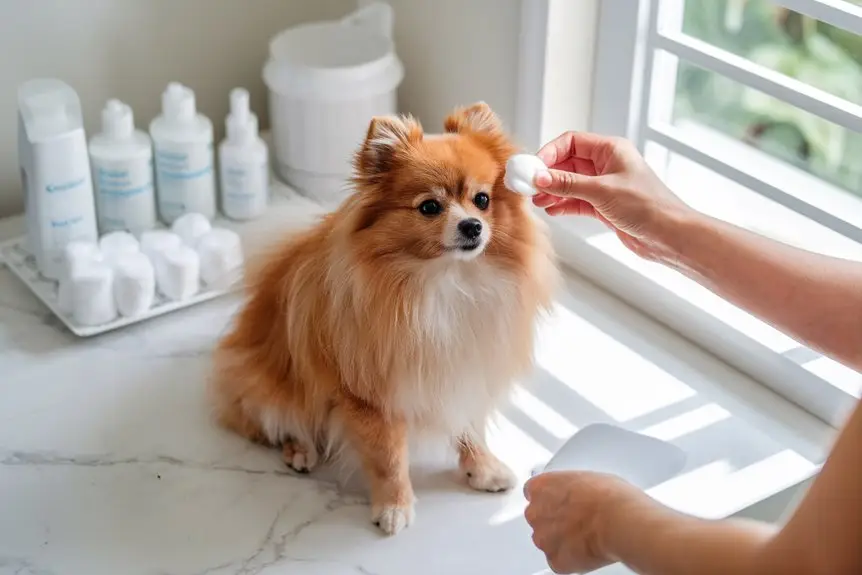
Beyond anal gland care, your Pom's fluffy ears can get pretty stinky too. Those cute little ears can trap moisture and bacteria, which means nasty smells if you don't keep them clean. You'll want to clean them once a week with a special ear cleaner to stop infections and bad odors.
Tips for cleaning your Pom's ears:
- Grab a vet-approved ear cleaner and cotton balls (skip the cotton swabs!)
- Just wipe what you can see in the ear canal – don't stick anything deep inside
- Keep an eye out for dark gunk, redness, or weird smells that might mean there's an infection
- If your Pom likes to swim or gets wet a lot, clean those ears more often
Your Pom scratching their ears like crazy or shaking their head a bunch? Better check with your vet – could be an ear infection that needs medicine.
Diet's Impact on Body Odor
What your Pom eats can totally change how they smell – it's as simple as that! Whether you're feeding them kibble or raw food, their diet makes a huge difference. Those high-grain kibbles? They can make your pup super gassy and mess with their tummy, leaving your house with some not-so-nice smells.
A lot of Pom parents say switching to raw food helped their dogs smell better and made their fur look amazing. But hey, don't just jump into raw feeding – check with your vet first because some Poms (especially ones with health issues) might not do well with it. If your furry friend is dealing with stinky gas problems, maybe try out some good quality grain-free food instead.
Just remember – whenever you switch up your pup's food, take it slow! Making changes too fast can upset their stomach and leave you dealing with even more smell issues. Keep an eye on how your little fluffball reacts to different foods since some food sensitivities can show up as funky body odors. Adding fresh green beans and other safe vegetables to their diet can help improve digestion and reduce unpleasant odors.
Creating an Odor Control Routine
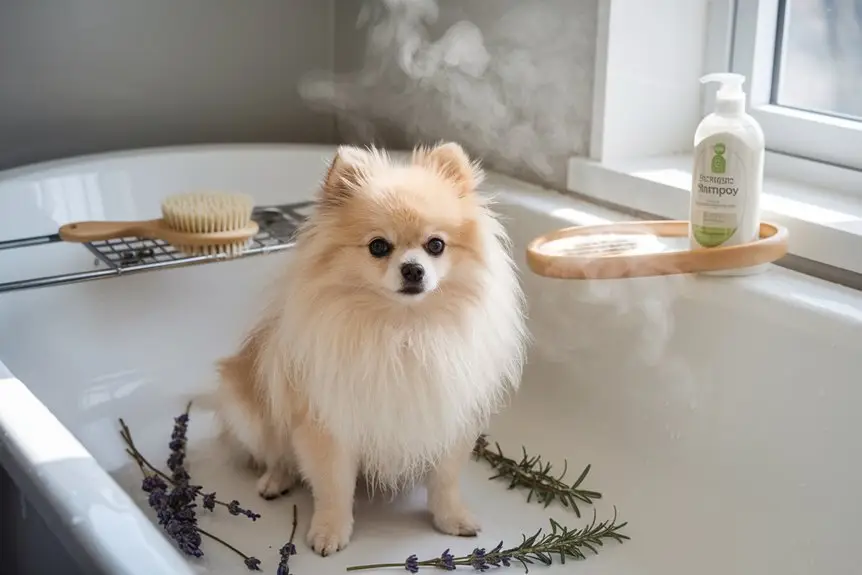
Let's talk about getting your Pom smelling fresh! A good odor control routine is super simple – it's all about staying on top of the basics and keeping your fluffy friend clean.
Just stick to these easy habits:
- Give your Pom a quick brush every day to keep their fur from getting tangled and dirty
- Clean those ears once a week with the right cleaner – no stinky bacteria allowed!
- Brush those tiny teeth 2-3 times a week and toss them some dental treats
- Swap out their bed blankets every couple weeks (having two sets makes this super easy)
And hey, don't skip the little stuff – wipe their face after they eat and clean up down there after potty time. Pop a reminder in your phone for monthly baths and regular vet visits to check on those anal glands and teeth. Trust me, your nose will thank you!
Since Pomeranians have a dense double coat, maintaining proper grooming is essential for preventing odors caused by trapped moisture and debris.
Frequently Asked Questions
Can Essential Oils Be Safely Used to Mask Pomeranian Odors?
Hey, you definitely don't want to put your little Pom in danger! Essential oils might smell nice to us, but they can make your furry friend really sick – it's best to keep them far away from any oils. Stick to regular baths and grooming, and grab some pet-friendly cleaners that your vet says are okay to use. Much safer for your pup!
Why Does My Pomeranian Smell Worse After Playing With Other Dogs?
Your Pom probably picked up funky smells from rubbing against their doggy friends, and all that running around made them work up a sweat! When dogs play together, they share their natural body oils and bacteria, which can make your pup smell a bit stinkier than usual. Just give them a good brush-down after playtime and that should help keep those smells in check.
Do Air Purifiers Help Reduce Pomeranian-Related Household Odors?
Air purifiers really do help with those Pom smells around your home! The ones with HEPA filters are great at catching all that fuzzy stuff – like fur, dander, and those tiny bits floating around in the air. To get the most out of your purifier, just make sure you're keeping up with brushing your Pom and doing regular house cleaning. It's a game-changer when you do both!
How Long Should I Wait Before Bathing After Flea Treatment?
Just put flea treatment on your dog? Hold up before you grab that shampoo! Give it at least 48 hours before getting them wet. This waiting time makes sure the medicine soaks in properly and actually works to kick those annoying fleas out. Don't rush the process – your pup's flea-free future depends on it!
Can Seasonal Changes Affect My Pomeranian's Natural Body Odor?
Yep, your Pom's smell can totally change with the seasons! During hot, sticky summers, they might get a bit stinkier because their body makes more oils to deal with the heat. When winter rolls around, the dry air can mess with their skin and make them smell different too. It's pretty normal – just like how we humans get sweaty in summer and dry skin in winter!
